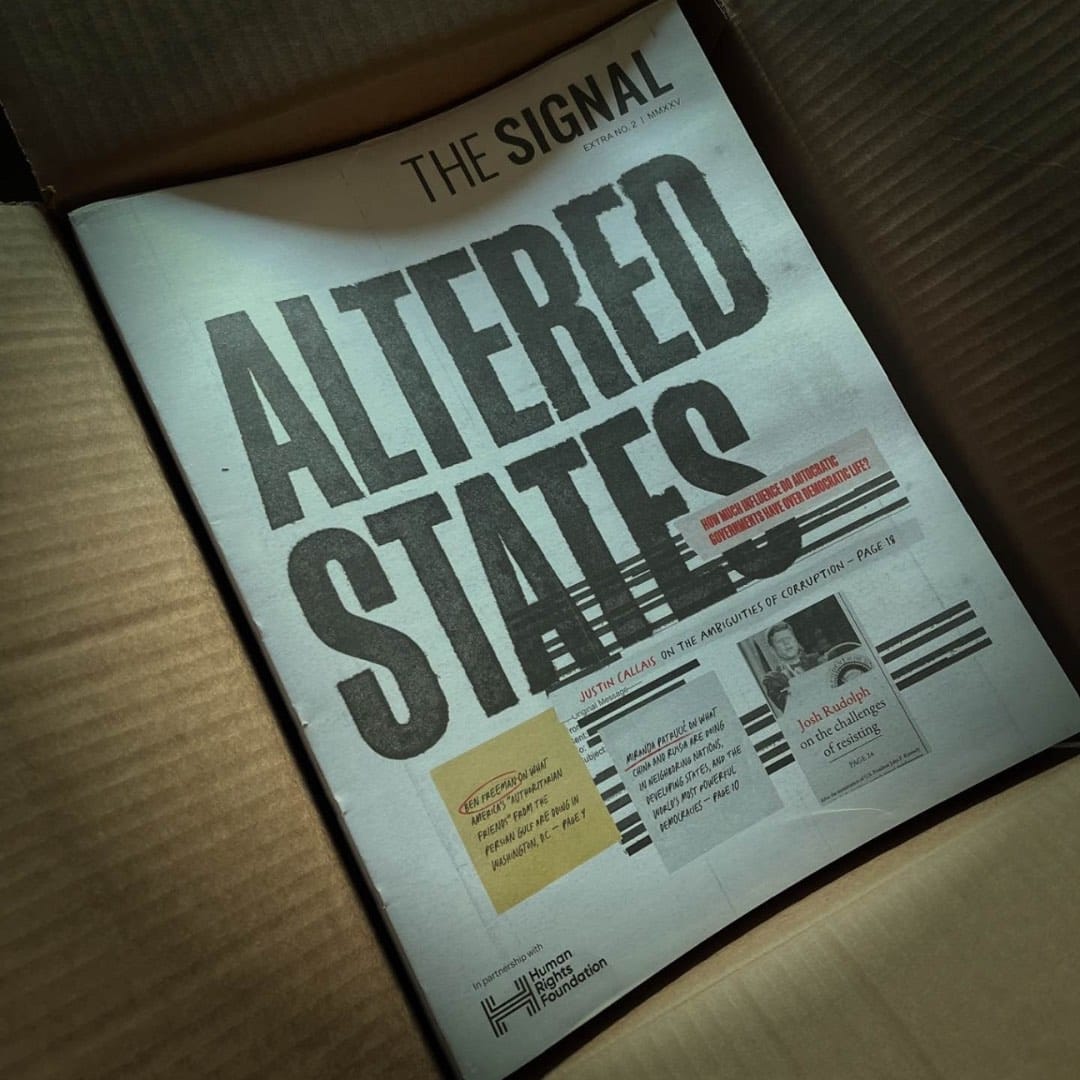‘Ready for a lasting peace’

Recently: Around the world, some cities and regions are getting wealthier; others are increasingly left behind. Why? Sir Paul Collier on hyper-centralization and the economic origins of the populist blame game.
Today: How much sense might it make to claim a big breakthrough when you’re skipping over every major remaining issue? The American president has seized on Hamas’s tentative agreements from Friday, declaring them on board for ending the war and telling Israel to stop bombing. Netanyahu’s going along with it, for now—looking at a plan that hasn’t reconciled potentially unreconcilable positions.
+ For members: The weekend despatch is out.
& New music from Sam Prekop ...
Developments
- A conditional yes in Gaza. Hamas said on Friday it would release all remaining Israeli hostages and hand Gaza’s administration to “independent technocrats”—though didn’t address U.S. President Donald Trump’s demand that the group disarm or accept no governance role. Trump has declared Hamas “ready for a lasting peace” anyway and ordered Israel to “immediately stop the bombing of Gaza” so hostages could be released safely—forcing Israel’s Prime Minister Benjamin Netanyahu into at least a tactical retreat, despite the plan’s core contradictions remaining unresolved.
- Prague pivots. The populist-right billionaire Andrej Babiš won the Czech Republic’s parliamentary elections with 35 percent of the vote, defeating Prime Minister Petr Fiala’s pro-Western coalition and putting the country on course to join Hungary and Slovakia in distancing from EU support for Ukraine. Babiš—a self-described “Trumpist” who co-founded the European Parliament’s far-right Patriots for Europe bloc with Viktor Orbán—said he’d seek a single-party government with tacit support from the anti-migrant Freedom and Direct Democracy party.
- Day three, no deal. The U.S. Senate rejected competing proposals on Friday to reopen the federal government for the second time in 24 hours, pushing the shutdown—now in its third day—into next week. Republicans offered a clean continuing resolution through November 21; Democrats demanded permanent extensions of expiring health-care subsidies. House Speaker Mike Johnson announced on Friday that the House won’t return to vote until at least October 7, while the Trump administration continues threatening mass federal layoffs during the impasse.
- Police gunfire in Manchester. British authorities disclosed on Friday that one of two victims killed in Thursday’s terrorist attack on a Manchester synagogue appears to have been accidentally shot by responding police. The attacker—identified as Jihad Al-Shamie, a 35-year-old British citizen of Syrian descent—drove a car into worshippers outside Heaton Park Hebrew Congregation on Yom Kippur before stabbing others. Armed officers killed him seven minutes after the first emergency call. Six people have been arrested on terrorism charges in connection with the attack. … See “‘The day … we knew would come’” in the weekend despatch.
- Canterbury’s first. The Church of England named Sarah Mullally as the next Archbishop of Canterbury on Friday—the first woman to lead the Anglican Communion’s 85 million members worldwide in its 1,400-year history. Mullally, 63, currently Bishop of London and formerly England’s Chief Nursing Officer, replaces Justin Welby, who resigned last year over failures to report decades of abuse. The appointment drew immediate criticism from conservative African church leaders and muted congratulations from the Vatican, where women remain barred from ordination.

‘Ready for a lasting peace’
Hamas responded Friday to Trump’s ultimatum—accept his Gaza plan by Sunday or face “all HELL”—with a statement agreeing to release every remaining hostage and hand administration of Gaza over to “independent technocrats.” What it didn’t address: Trump’s demands for disarmament or permanent exclusion from governance. Those issues, Hamas said, would require further talks.
Trump declared victory anyway. “Based on the Statement just issued by Hamas, I believe they are ready for a lasting PEACE,” he posted within an hour. “Israel must immediately stop the bombing of Gaza.” The move boxed in Netanyahu: Comply or defy Washington. He complied. Israeli officials confirmed their military had shifted to defensive operations, though some strikes did continue.
The plan is attempting to thread positions that remain, by all appearances, irreconcilable. Netanyahu insists Hamas must be destroyed—“either diplomatically, according to Trump’s plan, or militarily.” His coalition partners threatened to quit if the war ends before that happens. Hamas wants a permanent ceasefire with some governance role. International mediators want some form of Palestinian self-determination, while Netanyahu likens the idea of a Palestinian state at any time in the foreseeable future to “giving al-Qaeda a state one mile from New York City.”
By focusing on what Hamas agreed to, rather than what it sidestepped, Trump and his administration are enabling everyone to claim progress now while the real fight over disarmament and governance gets kicked down the road to the implementation phase—if that ever comes. Which is now at least very plausibly the point: a win declared, hard questions deferred.

How much influence do dictators have over democracies? Our second limited-run print magazine, Altered States …
Currently available in the U.S.A. If you’re interested in ordering internationally, have any questions, be in touch: concierge@thesgnl.com.
For members
The weekend despatch
- Why did OpenAI build a deep-fake app? They say it’s for fun with friends, but …
- What’s driving the global surge in antisemitism? The numbers are stark, the pattern is global, and the evidence leads in different directions.
- The intentional ambiguities of the Gaza peace plan. The ambiguous intentions of Trump’s “war from within.” Spreading paranoid style at the Pentagon. The end of Voice of America. … & The legacy of Jane Goodall.
- Why do Europe’s leaders finally seem willing to seize Russia’s frozen bank assets? Sir William Browder on a potential turning point in the Ukraine war.
Weather report
- After four hundred millimeters of rain and a 6.9-magnitude earthquake, what comes next?
+ Cultural intelligence
- Fifty comedians playing in Saudi Arabia, millions of dollars, and one head-scratcher: Why are they doing this?
- What’s so special about the Chinese tech multinational Huawei? Eva Dou, House of Huawei: Inside the Secret World of China’s Most Powerful Company.
- The strange world of modular synthesizers and patch cables. & The week in new music …
Your loyal guide to a changing world.
Membership with The Signal means exclusive access to premium benefits:
- Regular profiles on the questions behind the headlines
- In-depth feature interviews with our network of specialist contributors from across America and around the world
- The despatch, our weekly current-affairs and cultural-intelligence briefing
- Early access to new products, including print extras
It also means vital support for an independent new enterprise in current-affairs journalism.
‘Para’
Sam Prekop is a musician from Chicago known mostly as the singer for the indie-rock band The Sea and Cake. On his own, thought, he plunges into different music styles. On his new solo album, it’s the world of traditional modular synthesizers and patch cables. Which are known to be pesky and tough to control. But as Prekop shows you, if you get it right, they can make beautiful, layered sound.





